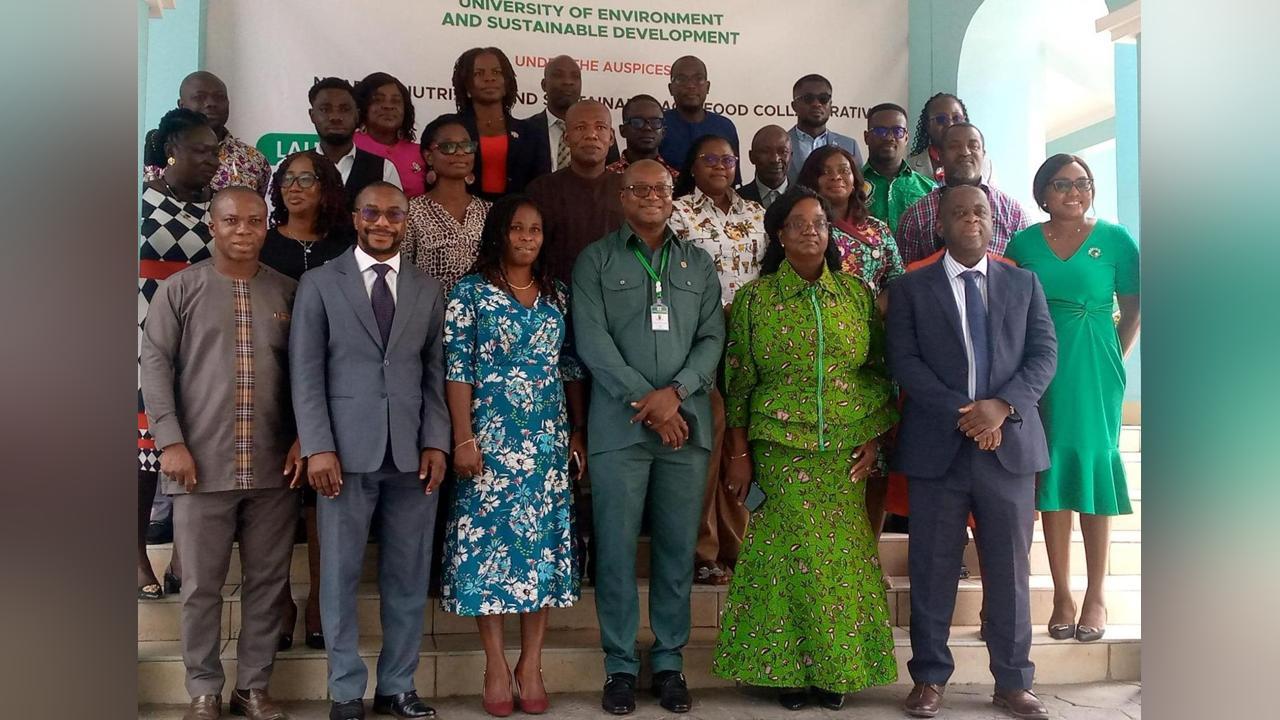Africa-Press – Ghana. The University of Environment and Sustainable Development (UESD) has unveiled ‘Nkabom’ Initiative, a transformative 10-year project, which aims to revolutionize Ghana’s agri-food sector while creating dignified employment opportunities for three million youth by 2030.
Through strategic partnerships, training programmes, and investment in agri-food enterprises, the initiative is designed to address key challenges in the agricultural and food industries by equipping youth with essential skills, fostering innovation, and promoting sustainable economic growth.
Speaking at a three-day inception workshop in Koforidua in the Eastern Region, Professor Eric Nyarko-Sampson, Vice-Chancellor of the University of Environment and Sustainable Development and Principal Investigator of the project, emphasized the profound significance of ‘Nkabom’—an Akan word meaning togetherness.
He explained that the term embodied the core mission of the initiative, which aims to foster collaboration and drive impactful change.
He said the ‘Nkabom’ initiative was a transformative, multi-stakeholder programme designed to tackle pressing challenges at the intersection of environmental sustainability, agricultural innovation, youth employment, and inclusive development in Ghana.
Over the next decade, it seeks to empower three million young people with dignified and fulfilling job opportunities while revolutionizing Ghana’s agri-food sector through strategic partnerships and targeted interventions.
He stressed the collective vision of creating a vibrant, sustainable, and inclusive ecosystem where agro-waste is repurposed as a valuable resource rather than discarded.
He also highlighted the importance of aquaculture as a key driver of food security and employment, while ensuring entrepreneurship remains an accessible opportunity for all, not just a privileged few.
Ghana and many nations across the Global South face a complex array of challenges, including rising youth unemployment, underutilized agricultural by-products, and fragile aquatic food systems.
Additionally, there is an urgent need to develop new academic programmes—both tertiary and non-tertiary—focused on agro-waste management and the growing demand for sustainable, green jobs.
Recognizing these challenges, UESD launched the ‘Nkabom’ Initiative as a holistic intervention integrating education, research, skills training, entrepreneurship, and policy dialogue. The project is built on three strategic pillars.
The first pillar, Education and Capacity Building, will see UESD leading advancements in agro-waste processing and aquaculture technology to equip youth with essential knowledge and technical skills.
The second pillar, Equity and Inclusion, ensures accessibility for marginalized groups by providing scholarships and wrap-around support services, particularly for women, persons with disabilities, internally displaced individuals, and youth from underserved communities.
The third pillar, Entrepreneurship Development, will offer specialized training in agro-waste bioprocessing, aquaculture enterprise management, and micro- and small-scale agribusiness, fostering a new generation of innovative entrepreneurs in the agri-food sector.
Professor Nyarko-Sampson remarked, “The project located in Somanya in the Eastern Region, places us at the crossroads of rural innovation, community engagement, and environmental stewardship.”
He noted that the three-day inception workshop would provide the platform to align their strategies, finalise their curriculum framework and training models.
It would also co-design research activities and establish monitoring and evaluation frameworks.
Professor Edward Wiafe Debrah, Nkabom Project Coordinator, highlighted that the initiative was supported by the Mastercard Foundation through McGill University.
He stated that that UESD’s primary focus within the project was the development of the agro-waste management and aquaculture technology entrepreneurship initiative to address critical challenges at the intersection of environmental sustainability, agricultural innovation, youth employment, and inclusive development in Ghana.
According to him, the agro-waste management and aquaculture technology entrepreneurship initiative aligns with SDGs one, two, five, eight, and thirteen, contributing to poverty reduction, food security, gender equality, economic growth, and climate action.
The Nkabom project is expected to create a substantial impact across multiple sectors. It aims to train over 340 youth in agro-waste processing and aquaculture technologies, generate at least
150 direct and indirect jobs in rural communities, and enhance the livelihoods of marginalized groups through targeted skills development and entrepreneurship training.
Key project partners include Koforidua Technical University, Kwame Nkrumah University of Science and Technology, University of Ghana, University of Health and Allied Sciences, Ashesi University, and the Association of Ghana Industries.
For More News And Analysis About Ghana Follow Africa-Press







